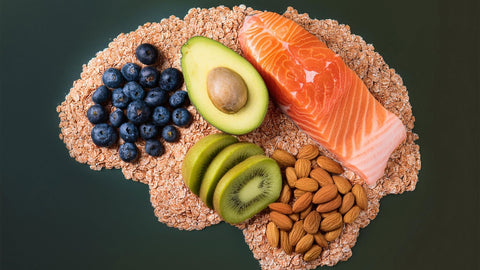Fueling Your Mind for Peak Performance
In today's fast-paced world, our brains are constantly bombarded with information and demands. Whether you're a busy professional juggling deadlines, a student tackling exams, or simply trying to stay sharp as you age, maintaining optimal brain health is crucial. While there's no magic pill for instant genius, incorporating certain foods into your diet can significantly support cognitive function, enhance focus, and boost memory.
The Brain-Boosting Powerhouse: Green Foods
At the heart of a brain-healthy diet lies a surprising champion: green foods. Packed with essential nutrients, vitamins, and antioxidants, these nutritional powerhouses offer a plethora of benefits for your mind and body. Let's delve into some of the top contenders:
-
Alfalfa: This nutrient-dense superfood is a rich source of chlorophyll, vitamins K and C, and minerals like calcium and magnesium. Chlorophyll, the pigment that gives plants their green color, has been linked to improved cognitive function and memory.
-
Barley Grass: Bursting with vitamins, minerals, and antioxidants, barley grass is a nutritional powerhouse. It's particularly rich in vitamin E, a potent antioxidant that protects brain cells from damage caused by free radicals.
-
Wheatgrass: Another chlorophyll-rich superfood, wheatgrass boasts an impressive nutritional profile. It's loaded with vitamins A, C, and E, as well as iron and amino acids. These nutrients play a vital role in supporting brain health and cognitive function.
-
Superfood Blends: Combining the power of multiple green foods and other nutrient-rich ingredients, superfood blends offer a convenient way to enhance your daily intake of brain-boosting nutrients.
Why Green Foods are Essential for Brain Health
Green foods offer a unique combination of nutrients that work synergistically to support optimal brain function. Here's how they contribute to a sharper mind:
-
Enhanced Blood Flow: Chlorophyll, abundant in green foods, helps improve blood circulation, ensuring that your brain receives an adequate supply of oxygen and nutrients.
-
Antioxidant Protection: Free radicals, unstable molecules produced during normal metabolic processes, can damage brain cells and contribute to cognitive decline. The antioxidants found in green foods help neutralize these harmful molecules, protecting your brain from oxidative stress.
-
Neurotransmitter Support: Green foods contain essential nutrients that support the production and function of neurotransmitters, the chemical messengers in your brain. These neurotransmitters play a crucial role in learning, memory, and mood regulation.
-
Reduced Inflammation: Chronic inflammation has been linked to cognitive decline and neurodegenerative diseases. Green foods possess anti-inflammatory properties that can help protect your brain from damage.
Incorporating Green Foods into Your Daily Routine
Adding green foods to your diet is easier than you might think. Here are some simple and delicious ways to enjoy their brain-boosting benefits:
-
Powders: Green powders can be easily added to smoothies, juices, or even water. Start with a small amount and gradually increase the dosage as needed.
-
Tablets: For those on the go, tablets offer a convenient way to get your daily dose of green foods. Simply take them with water or your favorite beverage.
-
Creative Recipes: Incorporate green powders into your favorite recipes, such as dips, sauces, and dressings. You can even add them to baked goods for a nutritional boost.
Beyond Green Foods: Other Brain-Boosting Foods
While green foods are a fantastic addition to a brain-healthy diet, other foods can also contribute to optimal cognitive function. Here are some of the top contenders:
-
Fatty Fish: Rich in omega-3 fatty acids, fatty fish like salmon, tuna, and mackerel are essential for brain health. Omega-3s support cognitive function, memory, and mood regulation.
-
Berries: Packed with antioxidants and flavonoids, berries are known for their brain-boosting properties. Blueberries, in particular, have been shown to improve memory and learning.
-
Nuts and Seeds: Walnuts, almonds, and flaxseeds are excellent sources of vitamin E, healthy fats, and other nutrients that support brain health.
-
Dark Chocolate: Indulging in a piece of dark chocolate can actually be good for your brain. Dark chocolate contains flavonoids that improve blood flow to the brain and enhance cognitive function.
-
Whole Grains: Opt for whole grains like brown rice, quinoa, and oats over refined grains. Whole grains provide a steady release of energy, helping you stay focused and alert.
Lifestyle Factors for Optimal Brain Health
While diet plays a crucial role in brain health, other lifestyle factors also contribute to a sharper mind. Here are some essential tips:
-
Regular Exercise: Physical activity not only benefits your body but also your brain. Exercise increases blood flow to the brain, promotes the growth of new brain cells, and enhances cognitive function.
-
Quality Sleep: Aim for 7-8 hours of quality sleep each night. Sleep is essential for memory consolidation and brain repair.
-
Stress Management: Chronic stress can take a toll on your brain health. Practice stress management techniques like meditation, yoga, or deep breathing exercises.
-
Mental Stimulation: Keep your brain active and engaged by challenging yourself with new activities, learning new skills, or engaging in puzzles and games.
Fuel Your Mind for Success
By incorporating brain-boosting foods into your diet and adopting a healthy lifestyle, you can support optimal cognitive function and enhance your mental performance. Whether you're striving for peak productivity at work, maintaining mental sharpness as you age, or simply looking to improve your overall well-being, prioritizing brain health is a smart investment in your future.
Remember: While this blog post provides valuable information about brain-boosting foods, it's not intended as a substitute for professional medical advice. Always consult with your healthcare provider before making any significant dietary changes or if you have any concerns about your health.




Comments (0)
There are no comments for this article. Be the first one to leave a message!